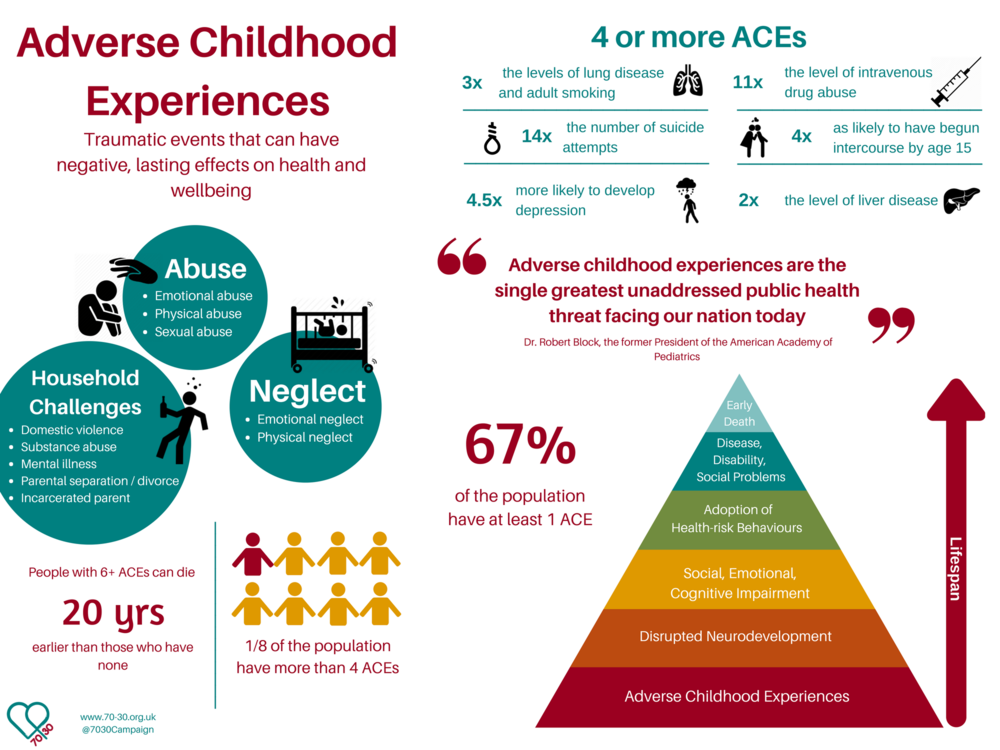Homeschool Life LLC
Volume 1, Issue 4

Association of Adverse Childhood Experiences (ACEs) and Epigenetic Gene Expression in Motivation, Emotion and Personality.
A person’s personality and physiology are greatly affected by Adverse Childhood Experiences (ACEs) and through gene expression (epigenetics) where environmental conditions trigger hypothalamo-pituitary-adrenal (HPA) responses that have long-lasting effects in adults. (Murgatroyd & Spengler, 2011) The study of epigenetics is being more and more understood and the data being collected over the last 10 to 20 years has had a major impact on developmental psychology by building a strong body of falsifiable hypotheses. One of the largest studies has been the Adverse Childhood Experiences (ACE) Study that was and still is a collaborative work by Kaiser Permanente's Health Appraisal Clinic in San Diego and the Centers for Disease Control. (Centers for Disease Control and Prevention, 2014) According to the study's questionnaire, a difficult childhood containing pushing, grabbing, insulting, threatening with physical harm (including spanking), or where a household member had drinking or substance abuse problem, depressed, attempted suicide, had a mental illness or went to prison. Also, if a child witnessed their caregiver (mother or father) being pushed, hit, slapped, threatened with harm. Also included in the questionnaire were areas of emotional and physical neglect/abuse and sexual abuse. (Centers for Disease Control and Prevention, 2014)
There were strong correlations between the findings and not just early death by a factor of 20 years, but of increased risk of cancer, heart disease, STD's, substance abuse, alcoholism, liver and lung disease, teen pregnancy, depression, suicide and domestic abuse among many others. (Storrs, 2009)
However, with intervention, therapy, self-work and a commitment to understand the sources of abuse, a person can improve and counteract the effects of a high ACE score and even benefit from ongoing adult epigenetic expression. However, an understanding as to a person's motivation, both positive and negative, from past experiences is not fully understood or explained in environmental gene expression alone, but it is clear that how a child is raised greatly influences motivation, communication and emotional triggers. We also know that a person’s personality is the entirety of their individual ideas, beliefs, behaviors and motivations resulting from the interplay between emotions, cognition and intelligence that is derived from evolutionary and heritable genetics, epigenetics, environmental and pedagogical inputs, feedback and stressors. Personality can also be defined as a person’s thinking patterns and individual behavior as they are made manifest in the levels of sociability or irritability. (American Psychological Association, 2017)
A therapeutic approach to understanding pedagogical or childhood trauma may include asking questions. For example; A person who normally has no problems with social interaction between co-workers, but is tongue-tied, stutters or feels great anxiety and stress with their boss - where does this behavior stem from? Could it be from an authoritarian parenting model where the child was not allowed to explain an uncomfortable event without fear of punishment, reprisal, skepticism and/or physical harm? It is conceivable that if an employee has a boss that reminds them of their parent or caregiver in some respect, that the internal emotional triggers that were installed by that parent could be clearly manifest.
Psychologist's difficulty with personality theory is that one theory is never adequate to explain all the complexities of personality alone and only a synthesis of theories could be actualized at some point in the future. Obviously, the question is not really Nature vs. Nurture as we cannot delineate personality in such a primitive framework. Our personalities are not completely static – they change over time to some extent and people go to therapy to work on aspects of their temperament and personality.
An examination of personality, motivation and emotion cannot begin to answer the question of how these traits are formed - merely that they exist and to what particular level of influence they affect. In other words, we can take personality tests and gain insight as to where we operate, but it does not explain how we developed those attributes. However, that does not mean that these models are useless - each model grants a perspective as to the nature of motivation, personality and emotion and how it fits into the greater framework of the development of these traits in children. That greater framework is how children are treated and raised. We know that stress negatively impacts the developmental of limbic structures like the hippocampus and the amygdala which regulates and processes emotion and that these children have higher occurrences of anxiety and mood disorders and difficulty in emotional self-regulating. (Tottenham, 2010) What are the stressors? How are children stressed and how often? What is the result of perpetual stress? How much stress was being applied to the various generations of children compared to now? These are our keys to understanding motivation, personality and emotion.
References:
American Psychological Association. (2017). Presonality. Retrieved from American Psychological Association.
Centers for Disease Control and Prevention. (2014, May 13). Adverse Childhood Experiences (ACE) Study. Retrieved November 8, 2015, from cdc.gov: http://www.cdc.gov/violenceprevention/acestudy/index.html
Murgatroyd, C., & Spengler, D. (2011). Epigenetics of Early Child Development. Retrieved 2015, from Frontiers in Psychiatry: http://doi.org/10.3389/fpsyt.2011.00016
Storrs, C. (2009, October 7). Is Life Expectancy Reduced by a Traumatic Childhood? Retrieved November 8, 2015, from ScientificAmerican.com: http://www.scientificamerican.com/article/childhood-adverse-event-life-expectancy-abuse-mortality/
Tottenham, N. H. (2010). Prolonged institutional rearing is associated with atypically larger amygdala volume and difficulties in emotion regulation. Developmental Science, 13(1), 46. doi:10.1111/j.1467-7687.2009.00852.x